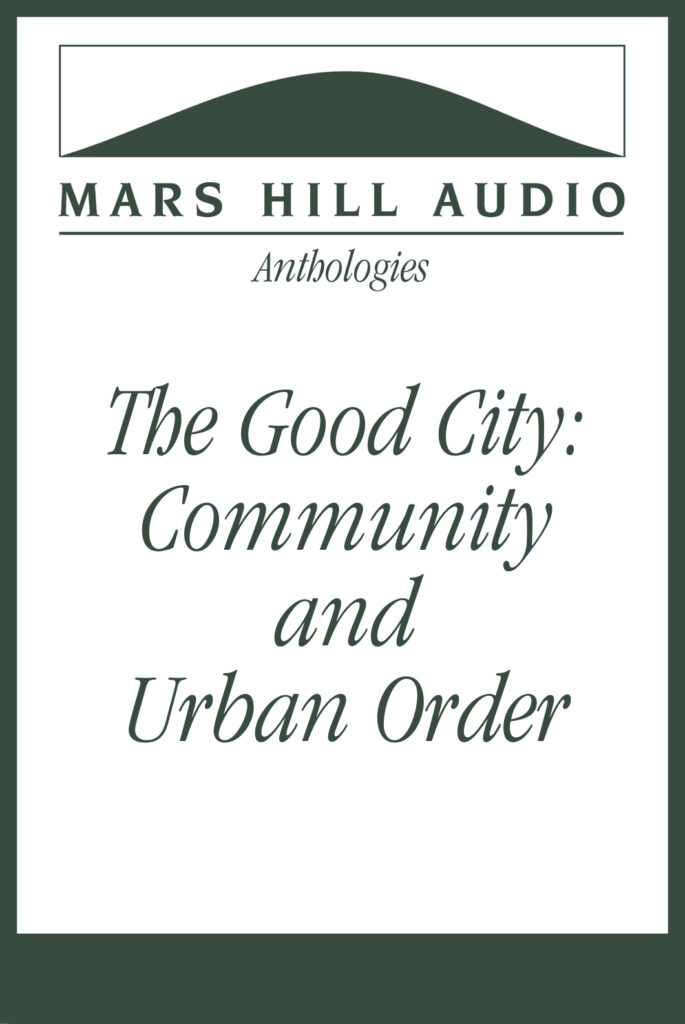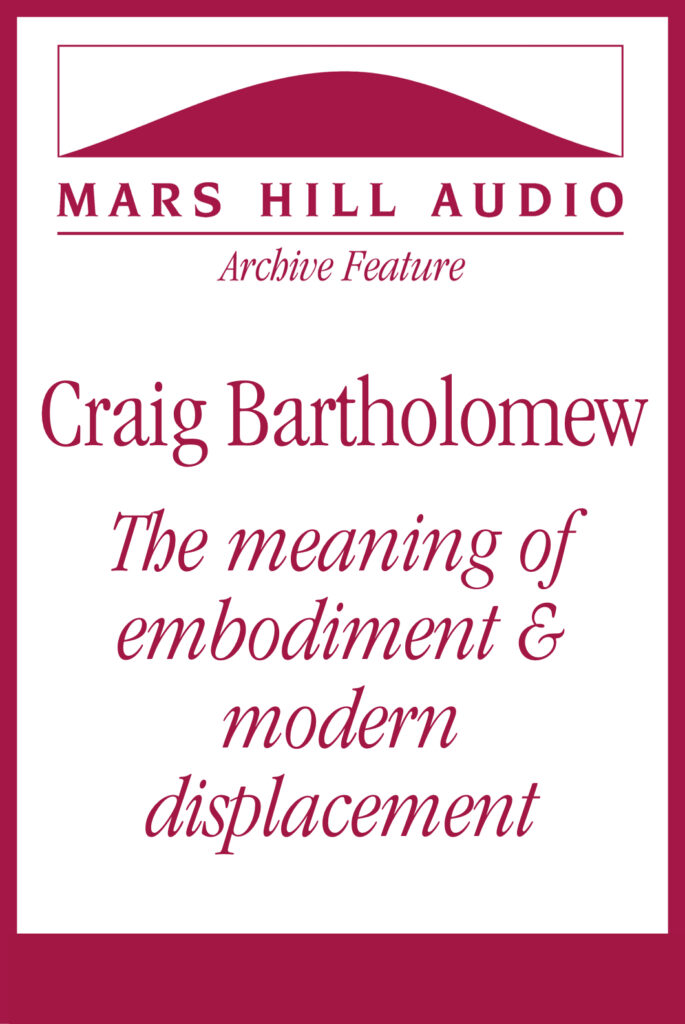released 2/1/2013
In this Anthology, Ken Myers interviews seven guests — architects, geographers, and historians and clergy — about the nature of good urban environments, about how loving our neighbors can and must take shape in how we order the material aspects of shared life. The conversations on this Anthology give particular attention to how the New Urbanist movement has challenged the dehumanizing effects of modernism in urban design.
James Howard Kunstler opens our eyes to the “mutilated urbanism” of so much of America’s built environment. On a more hopeful note, architect Jeff Speck introduces New Urbanism’s response to that critique, and Richard Moe describes the Preservationist Movement’s maintaining of old neighborhoods. After a summary segment from architectural historian Vincent Scully, Philip Bess elaborates on the natural law framework within which New Urbanists are operating, while David Harvey describes the impact of the automobile, and the unwitting destruction of truly private as well as truly public spaces. Pastor Eric Jacobsen closes with a discussion of a proper Christian understanding of human flourishing, and challenges the Church to lead the recovery of healthy community.
(100 minutes)
PREVIEW
You are unauthorized to view this page.
Theologian Craig Bartholomew observes that global culture is structured so as to increase spending and consumption; that is, it’s built like a commercial mall. Neglect of the meaningfulness of embodied engagement with the world beyond commercial activity has caused modern men and women to forget that “One of the glories of being human and creaturely is to be implaced.” Early in his book, Where Mortals Dwell: A Christian View of Place for Today, Bartholomew laments the “fatal tendency in modernity to privilege abstract, scientific knowledge over everyday experience as the path to the truth about the world.” Because modern culture has tended to deny or obscure concrete aspects of our creatureliness, we are suffering what many have called a crisis of place. Bartholomew ends by reflecting on the incredible fertility of Scripture’s view of place.
Related reading and listening
- Antagonism or fruitfulness? — FROM VOL. 108 Jean Porter describes how natural law justifies legal and moral authority within the life of the human person. (17 minutes)
- The collapse of public life — FROM VOL. 154 D. C. Schindler explains how liberalism sought to make way for individuals to function together without any orientation to an explicit common good. (37 minutes)
- The personal element in all knowing — Mark Mitchell connects key aspects of Michael Polanyi’s conception of knowledge with Matthew Crawford’s insistence that real knowing involves more than technique. (34 minutes)
- Impact of “infotainment” on community — Neil Gabler and C. John Sommerville discuss how the mentalities conveyed by our experience with communications media work against the nurturing of community. (36 minutes)
- The digital revolution and community — FROM VOL. 7 Ken Myers talks with Jane Metcalfe, the founder of WIRED Magazine, about technology and community. (8 minutes)
- Education that counters alienation — In this lecture, Jeanne Schindler explores how digital technologies warp not only education but our experience of being human. (30 minutes)
- Courtesy as a theological issue — FROM VOL. 37 Donald McCullough discusses his insights into the increasingly coarse nature of society and the theological foundations for courtesy. (12 minutes)
- The historian’s communal role as storyteller — FROM VOL. 127 Historian Christopher Shannon discusses how American academic historical writing presents a grand narrative of progressivism, which it defends by subscribing to an orthodoxy of objective Reason. (21 minutes)
- Friendship and life together — In a lecture at Providence College, Ken Myers explores how the concept of friendship, which used to be central to political philosophy, was banished from considerations of public life as the state was exalted over society. (53 minutes)
- Blest be the ties of language that bind us — Marion Montgomery on the precious gift of words
- The academy’s deconstruction of both person and community — Marion Montgomery on cultivating “a deportment of intellect governed by a continuing concern for the truth of things”
- Jacobsen, Eric O. — FROM THE GUEST PAGE: Rev. Eric O Jacobsen is the pastor of the First Presbyterian Church (ECO) in Tacoma, WA. He is the author of numerous books and articles on the relationship between the built environment and the Christian faith.
- Community, the giver of freedom — Thomas H. Naylor and William H. Willimon on why suspicion about big government shouldn’t take the form of autonomous individualism
- Welcoming one another — Christine Pohl describes the practice of hospitality in Church history and the particular challenges to hospitality we face in our era. (30 minutes)
- Convivial is beautiful — Ivan Illich on “the opposite of industrial productivity”
- Loving relationships in community — In conversation with moral philosopher Oliver O’Donovan, and with readings from his book, Entering into Rest, Ken Myers explores a central theme in O’Donovan’s work: that we are created to enjoy loving relationships in community. (27 minutes)
- Mars Hill Audio Journal, Volume 150 — FEATURED GUESTS:
David I. Smith, Eric O. Jacobsen, Matthew Crawford, Andrew Davison, Joseph E. Davis, and Rebecca Konyndyk DeYoung
- Why churches should be more attentive to space — Eric O. Jacobsen discusses New Urbanism with a Christian perspective, imagining how we might organize places in which life may be lived at a human scale and in which real community is nourished. (26 minutes)
- Freed from the burden of choice — Writing in the mid-1990s, Alan Ehrenhalt reflects on the relationship between authority and community
- Why communities need authority — Alan Ehrenhalt argues that real community can only be sustained when three things are assumed: the goodness of limits, the necessity of authority, and the reality of personal sin. (13 minutes)
- The Bruderhof’s Christ-centered community — Clare Stober discusses the book she edited of stories of the Bruderhof, a network of 26 community settlements around the world. (30 minutes)
- Lessons from quarantine: Making do with tinned fruit — In this audio reprint of “Wendell Berry and Zoom,” Front Porch Republic editor Jeffrey Bilbro reflects on two metaphors that can help put our new-found “dependency” on web-based video conferencing into perspective: tinned fruit and a prosthetic limb. (17 minutes)
- Keeping “the good” in the common good — D. C. Schindler on the metaphysical character of real community
- Mars Hill Audio Journal, Volume 124 — FEATURED GUESTS:
John Fea, Robert F. Rea, John C. Pinheiro, R. J. Snell, Duncan G. Stroik, Kate Tamarkin, and Fiona Hughes
- How communities remember who they are — Oliver O’Donovan on the necessity of tradition in sustaining communal identity
- Mars Hill Audio Journal, Volume 116 — FEATURED GUESTS: Stratford Caldecott, Fred Bahnson, Eric O. Jacobsen, J. Budziszewski, Brian Brock, and Allen Verhey
- Mars Hill Audio Journal, Volume 113 — FEATURED GUESTS: Steven Shapin, Arthur Boers, Christine Pohl, Norman Wirzba, Craig Bartholomew, and David I. Smith
- Mars Hill Audio Journal, Volume 108 — FEATURED GUESTS: Thomas Albert Howard, Jean Porter, Peter Augustine Lawler, Hans Boersma, Felicia Wu Song, and Elias Aboujaoude
- Mars Hill Audio Journal, Volume 87 — FEATURED GUESTS: John Witte, Jr., Steven Keillor, Philip Bess, Scott Cairns, and Anthony Esolen
- Joshua P. Hochschild: “Globalization: Ancient and Modern” — Joshua P. Hochschild examines the effects of globalization on local communities and argues for the need for reflection on the ends of politics given the ends of human beings. (36 minutes)
- Mars Hill Audio Journal, Volume 80 — FEATURED GUESTS: Stephen A. McKnight, Tim Morris, Don Petcher, Vigen Guroian, Paul Valliere, and Calvin Stapert
- Mars Hill Audio Journal, Volume 68 — FEATURED GUESTS: Murray Milner, Jr., Steven C. Vryhof, Douglas J. Schuurman, Robert Gagnon, Richard Stivers, and Quentin Schultze
- Mars Hill Audio Journal, Volume 67 — FEATURED GUESTS: Eric O. Jacobsen, Allan C. Carlson, Terence L. Nichols, R. R. Reno, David Bentley Hart, J. A. C. Redford, and Scott Cairns
- Place, Community, and Memory — Several essayists and a novelist explore the important ways in which we (and the communities we inhabit) are shaped and sustained by the particular places in which we live. (100 minutes)
- Church, Community, and History — Sociologist Robert Wuthnow discusses the assets and liabilities of the small-group movement. Theologian Richard Lints explains why theological reflection is essential in Christian community. (84 minutes)

